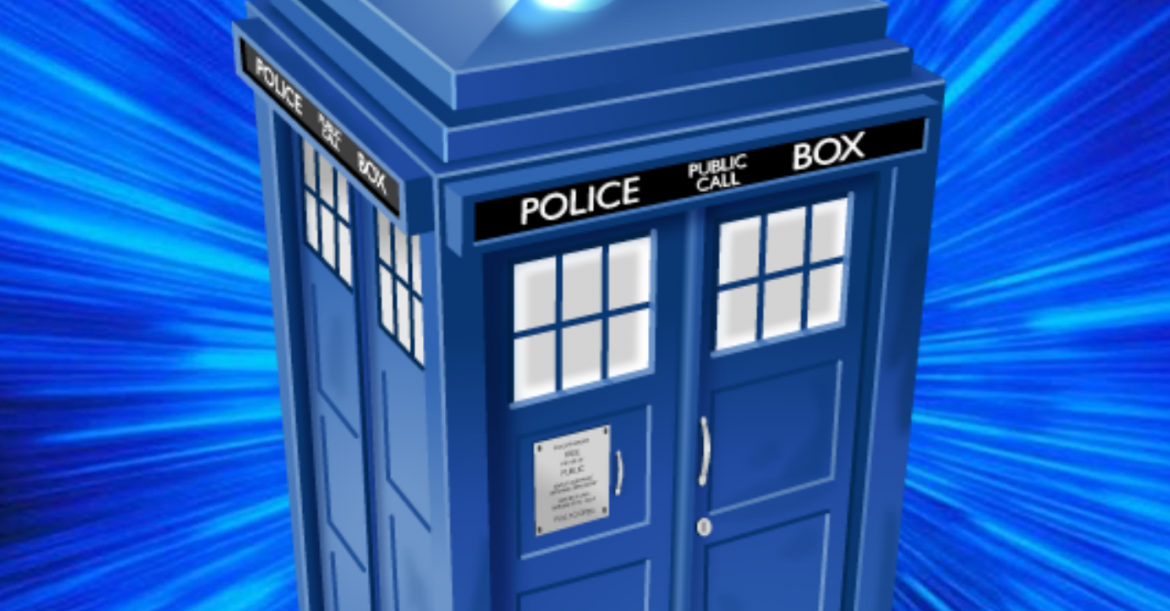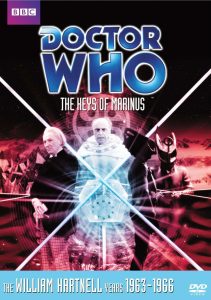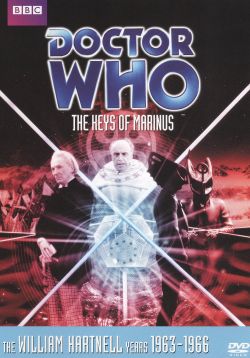In the Beginning – A Doctor Who – Season 1 Review
Greetings and Salutations Vortexers,
Hope that everyone is doing well as everything continues opening up. This is the first of a potential review series on Doctor Who. I’ve already done some Big Finish reviews for Traveling the Vortex and am considering a new series where, off and on, I hope to review (and potentially discuss) various topics within the Doctor Who universe. This might be a one-off or the beginning of a series.
Anyway, today’s topic of discussion is Season 1. That’s the first Hartnell season from 1963-1964, not Series 1 from 2005. Off and on, I hope to discuss a season (or arc or something similar) of Doctor Who. Hopefully, this can either lead to an Episode of TTV focusing on a broad discussion of the featured topic or to a discussion on the Facebook forum. As this is the first of these, this may get a little long-winded and rambling, though hopefully not too much.
So Season 1. Eight stories spread across forty-two episodes that ran between November 23, 1963, and September 12, 1964. It introduces us to the First Doctor, Ian Chesterton, Barbara Wright, Susan Foreman, the TARDIS, and the Daleks. Of the eight stories, one is completely missing and one is partially missing with a total of nine missing episodes from this season.
For reference, I have seen all of these (or, in the case of Marco Polo, listened to the audio) at one point and have been working my way through the novelizations as availability allows (I get them through my local library’s Inter-Library Loan service). I will briefly discuss the ones I’ve read where relevant. Also, while I have experienced all of these stories, I have not done so recently. As such, I don’t plan on going into as much detail on these as I have in my Big Finish reviews.
The Stories
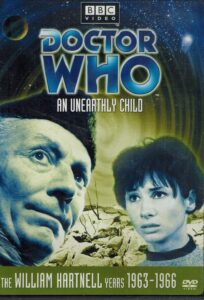 An Unearthly Child. The first Doctor Who story and famous in its own rite. This one is packaged as a four-part serial that introduces us to everything and then settles into a run-of-the-mill caveman story. However, as the blog (and later book series) TARDIS Eruditorum puts forth, this is actually two different stories: the one-part “An Unearthly Child” and the three-part “100,000 BC”.
An Unearthly Child. The first Doctor Who story and famous in its own rite. This one is packaged as a four-part serial that introduces us to everything and then settles into a run-of-the-mill caveman story. However, as the blog (and later book series) TARDIS Eruditorum puts forth, this is actually two different stories: the one-part “An Unearthly Child” and the three-part “100,000 BC”.
Part 1 is great. Atmospheric, high concept, and just some really good drama. I have watched this episode quite recently and it really stands up well. It introduces us to the four leads and lays out the mystery of the Doctor and Susan. Ian and Barbara are great characters who really do act as the audience surrogates into the Doctor’s world.
The rest of the story (100,000 BC or “The Tribe of Gum” depending on where you’re getting your alternate titles) is okay with good character development for the leads but not much else. The cavemen get pretty old, pretty quick. The sets are decent enough and when looked at this being akin to a televised stage play, it works well. I’d rate this story at 10/10 for An Unearthly Child and 6/10 for 100,000 BC. Traveling the Vortex reviewed the TV Story in Episode #41 back in October 2011.
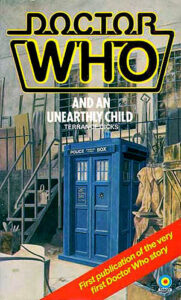 The novelization was published in October 1981 and written by Terrance Dicks. It’s good, not terribly meaty in greatly expanding the story, but it’s very readable. It follows the TV episodes quite faithfully and for a young reader (especially one who’s never seen the actual episodes) it paints a good picture of the landscapes and surroundings, expanding them past painted background and a few pieces of set dressing. As it stands, this was also my introduction to the Target novelizations. Something that really stood out to me in this was a couple of little historical clarifications for the readers of 1981 (and today) about Police Boxes (which were commonplace in 1963 but nearly extinct in 1981) and the UK adopting a decimal system for a currency which was a major point in making Susan seem alien. Dicks writes: “At this time, the early 1960s, Britain was still sticking to her uniquely complicated monetary system…” which he then breaks down briefly for the reader. (For the record, the UK adopted a decimal system for currency in February 1971.)
The novelization was published in October 1981 and written by Terrance Dicks. It’s good, not terribly meaty in greatly expanding the story, but it’s very readable. It follows the TV episodes quite faithfully and for a young reader (especially one who’s never seen the actual episodes) it paints a good picture of the landscapes and surroundings, expanding them past painted background and a few pieces of set dressing. As it stands, this was also my introduction to the Target novelizations. Something that really stood out to me in this was a couple of little historical clarifications for the readers of 1981 (and today) about Police Boxes (which were commonplace in 1963 but nearly extinct in 1981) and the UK adopting a decimal system for a currency which was a major point in making Susan seem alien. Dicks writes: “At this time, the early 1960s, Britain was still sticking to her uniquely complicated monetary system…” which he then breaks down briefly for the reader. (For the record, the UK adopted a decimal system for currency in February 1971.)
I can see why kids loved these. It moves along at a good pace, this story at least is a faithful recreation of the TV story. It’s an easy read that’s well written. You get into the heads of the characters a little and you don’t have to rely on low-budget BBC effects. In my mind, because I have seen the TV episodes, I still see at least some of the sets in my mind. The voices of the main cast are perfectly in line with the show, and I can somewhat hear the guest cast in my head as I read. I rate this at 8/10.
The Daleks (aka The Mutants – though this easily causes confusion with a Pertwee story of the same name). It’s good, but could easily have been fewer episodes. At seven episodes, it drags quite a bit in the middle. As an introductory story for the Daleks and Thals, it’s good. Too long, but good. I credit this story and the way the Daleks took off as what saved Doctor Who from becoming a forgotten relic of the 60s. My rating would be 7/10. Traveling the Vortex reviewed the TV Story in Episode #10 in March 2011 as part of an Adversary Archive. On a side note, I have not seen the Cushing film adaptation of this.
The novelization, the first Doctor Who book ever, was written by David Whitaker and released in November 1964 as “Dr. Who in an Exciting Adventure with the Daleks”. A re-release in 1973 led to the creation of the Target range (at least according to Tardis Wiki). This is an interesting little novel. I read the 2011 edition titled Doctor Who and the Daleks which has some background notes and an introduction by Neil Gaiman.
 First, let’s talk briefly about the author. David Whitaker is up there among the people who majorly shaped early Doctor Who. He was the show’s first Script Editor covering the period from An Unearthly Child through The Dalek Invasion of Earth and wrote eight TV stories including both Power of the Daleks and Evil of the Daleks.
First, let’s talk briefly about the author. David Whitaker is up there among the people who majorly shaped early Doctor Who. He was the show’s first Script Editor covering the period from An Unearthly Child through The Dalek Invasion of Earth and wrote eight TV stories including both Power of the Daleks and Evil of the Daleks.
Because this was the first Doctor Who novel written, it’s first couple of chapters retell the events of An Unearthly Child, sort of. First of all, this is written in the first person from the perspective of the companion Ian Chesterton. Instead of he and Barbara being Susan’s teachers, he is a scientist who is on his way home from a failed job interview and encounters Barbara (who’s described as being in her early twenties) at the scene of a car wreck on Barnes Common. Barbara is Susan’s tutor, having been hired by the Doctor.
Once we get to the actual events of The Daleks however, it follows the TV story fairly faithfully. As it’s told in first-person, there are scenes in the TV story where  Ian isn’t present that are dropped or told secondhand. Whereas the TV version tends to drag in the middle, this clips along at a decent pace and the environment and descriptions aren’t limited to a TV budget. The chasm scene, which tends to drag in the TV story, is thrilling and the death of a secondary character carries more impact here. On the whole, it was enjoyable. Just, a bit unusual. I’d rate this a 7/10.
Ian isn’t present that are dropped or told secondhand. Whereas the TV version tends to drag in the middle, this clips along at a decent pace and the environment and descriptions aren’t limited to a TV budget. The chasm scene, which tends to drag in the TV story, is thrilling and the death of a secondary character carries more impact here. On the whole, it was enjoyable. Just, a bit unusual. I’d rate this a 7/10.
The Edge of Destruction. Not really much to say here. A nice little two-parter where the TARDIS tries to tell the crew that something’s wrong. It feels like an improv session in some ways. Not bad, but not great. The best part about it is that it establishes the TARDIS as a character in her own right. I rate this 5/10. The novelization was published in October 1988 and written by Nigel Robinson. Traveling the Vortex reviewed this in Episode #41 back in October 2011.
Marco Polo. The only serial this season that’s completely missing, this is potentially a great lost classic. It’s a seven-part road trip story with history, science, intrigue, and action. This is possibly the story that best fills the educational remit of the original show before it devolved (or regenerated if you will) into a straight sci-fi show that 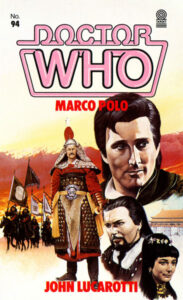 always had to have a monster even if the story didn’t really need one. I’d love to see all the missing episodes found or at least animated, as this is quite high on my list of missing stories to recover/animate. Not only would it allow for a Season 1 Blu-ray boxset, but it’s also just a good story. I rate it at an 8/10 or 9/10, but being able to see it might bring it higher, or lower though that’s unlikely. The novelization was published in April 1985 and was written by the TV Story’s author, John Lucarotti. Traveling the Vortex reviewed the half-hour recon of this that was included on “The Beginning” DVD set in Episode #41 back in October 2011.
always had to have a monster even if the story didn’t really need one. I’d love to see all the missing episodes found or at least animated, as this is quite high on my list of missing stories to recover/animate. Not only would it allow for a Season 1 Blu-ray boxset, but it’s also just a good story. I rate it at an 8/10 or 9/10, but being able to see it might bring it higher, or lower though that’s unlikely. The novelization was published in April 1985 and was written by the TV Story’s author, John Lucarotti. Traveling the Vortex reviewed the half-hour recon of this that was included on “The Beginning” DVD set in Episode #41 back in October 2011.
The Keys of Marinus. A six-part quest story by Dalek creator Terry Nation and one of two stories Nation wrote for the show that doesn’t feature the Daleks. It’s decent enough. The different location every episode helps keep it fresh (though it’s still too long). Three or four parts really is the ideal length for Doctor Who. Not too long and dragging (though it sometimes is), and not too short so that they can fit a good story in there and let it breathe. The Voord is an interesting villain when the story does them well, though I vaguely remember them being worthless in some scenes. I rate this a 7/10. The novelization was published in August 1980 and was written by Philip Hinchcliffe. Traveling the Vortex reviewed this story in TTV #76 back in June 2012.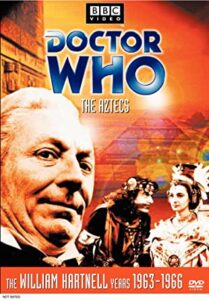
The Aztecs. There’s a reason this was picked for the First Doctor Revisited. Yeah, there are other stories I might’ve picked, but this a great story. It’s four parts, it’s the first surviving historical and it’s just a really good story. It shows the Doctor’s (and really Gallifrey’s) take on time travel. “You can’t rewrite history, not one line.” It’s really Barbara’s story, though we get good stuff with the Doctor, Ian, and Susan as well. The supporting cast is excellent and gives us a good taste of life in the Aztec Empire. I easily rate this a 10/10. Traveling the Vortex reviewed this story in TTV #17 back in April 2011.
The novelization was published in September 1984 and was written by the TV Story’s author, John Lucarotti. It’s good, a quick read that follows the TV story well without much expansion. It does make the Aztec city feel more real than a few sets and a visibly painted backdrop. So far, the Target novels I’ve read (I don’t count The Daleks) have been enjoyable and it’s easy to see how they captured a generation of young readers. I’d rate the novelization 10/10.
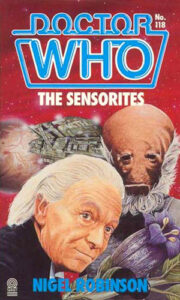 The Sensorites. This one is okay. It’s a sci-fi piece with weird-looking aliens and a small crew of space explorers. It’s also two episodes too long and kinda takes a left turn halfway through. The first episode is really atmospheric and creepy. The rest is, okay but not great. I rate this at 5/10. Traveling the Vortex reviewed this story in Episode #214 back in February 2015.
The Sensorites. This one is okay. It’s a sci-fi piece with weird-looking aliens and a small crew of space explorers. It’s also two episodes too long and kinda takes a left turn halfway through. The first episode is really atmospheric and creepy. The rest is, okay but not great. I rate this at 5/10. Traveling the Vortex reviewed this story in Episode #214 back in February 2015.
The novelization was published in July 1987 and was written by Nigel Robinson. It’s surprisingly really good. Reading it, what first stood out was the descriptive prose that just seemed to flow really well. Compared to his Timewyrm novel (Apocalypse) in the Virgin New Adventures which I just found to be an average middling Doctor Who story, this was really good. I’m not an expert on the Target Novelizations having only read the four featured here, but this is possibly the best so far. The Daleks is the worst, but by no means bad, just really different in its writing style and the way it handled the first few chapters (very loosely based on An Unearthly Child). This book on the other hand, while not really adding much to the TV story, really made a middling story enjoyable for me. I’d rate this at 10/10.
The final story of the season is The Reign of Terror. It’s another historical with two missing episodes. However, these have since been animated so it’s available  to watch again (at least on DVD as I’ve noticed that as far as I can tell, Britbox, which I don’t have a subscription to, doesn’t have any missing episode stories even if they’ve been animated). I like the animated episodes. I’ll take them over recons any day even if the animation is a bit stilted. I don’t remember much about the specific details of the animation since it’s been years since I’ve watched this one.
to watch again (at least on DVD as I’ve noticed that as far as I can tell, Britbox, which I don’t have a subscription to, doesn’t have any missing episode stories even if they’ve been animated). I like the animated episodes. I’ll take them over recons any day even if the animation is a bit stilted. I don’t remember much about the specific details of the animation since it’s been years since I’ve watched this one.
The story itself is okay. The group arrives during the French Revolution, gets split up, and plays catch and escape for six episodes while meeting famous people. It’s okay, but not a favorite. I don’t remember any of the historical figures being very distinct. As with most historicals, it does a good enough job of making the viewer want to look deeper into the subject matter. I rate it a 6/10. The novelization was published in August 1987 and was written by Ian Marter. According to Tardis Wiki: “The novel was one of several completed by Ian Marter shortly before his death in October 1986. It was published posthumously.” Traveling the Vortex reviewed this story in Episode #114 back in March 2013.
The Main Cast
 So that’s the stories, what about the main cast? We have to start with the Doctor. He’s definitely not the hero we know and love. He’s violent, arrogant, and suspicious of everyone, possibly to the point of being paranoid. Yes, Hartnell does have that twinkle in his eye and he has a soft side and a fun sense of humor but it takes those a while to surface. We get bits of it in the Aztecs, but it’s not really until season 2 and the arrival of Vicki that that sense of humor really surfaces. The building blocks are there for our Doctor, but they’re still being refined. Tardis Eruditorum (which is definitely worth checking out) puts forth that Hartnell’s Doctor is very much a background figure rather than a leading man and I tend to agree.
So that’s the stories, what about the main cast? We have to start with the Doctor. He’s definitely not the hero we know and love. He’s violent, arrogant, and suspicious of everyone, possibly to the point of being paranoid. Yes, Hartnell does have that twinkle in his eye and he has a soft side and a fun sense of humor but it takes those a while to surface. We get bits of it in the Aztecs, but it’s not really until season 2 and the arrival of Vicki that that sense of humor really surfaces. The building blocks are there for our Doctor, but they’re still being refined. Tardis Eruditorum (which is definitely worth checking out) puts forth that Hartnell’s Doctor is very much a background figure rather than a leading man and I tend to agree.
As for William Hartnell, he does well in the role. His “Billy fluffs” make the character a bit more endearing. I watched a little bit of This Sporting Life where Hartnell plays a supporting role. It’s not a bad film, just not my cup of tea. What I saw of Hartnell was very good and I can see why this prompted Verity to suggest Hartnell for the role of the Doctor. I also watched Carry On Sergeant and thoroughly enjoyed it despite its slow start. I saw bits of the Doctor in Hartnell and understand his enjoyment of the character after playing gruff army types. On the whole, I think this is my least favorite incarnation. However, that doesn’t mean I don’t like him.
I want to like Susan, and the older Susan we see in the Eighth Doctor adventures from Big Finish is likable. But here, the weirdness that was portrayed in An Unearthly Child is very much dropped and Susan just becomes an annoying girl who screams at everything. We get a glimpse of her telepathic (or is it psychic) abilities in the Sensorites (as well as a brief description of Gallifrey), but that’s it. It’s not necessarily the actress’s fault, Carole Ann Ford does fine with what she’s given, she’s just not given that much to do. And while part of it may be the time it was made, it looks bad in today’s eyes. She’s excellent in the Susan’s War boxset from Big Finish. As for any roles outside of Who, I haven’t seen any, so I can’t comment on her acting abilities in other roles.
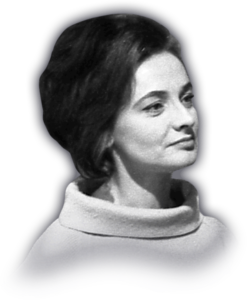 I love Ian and Barbara, easily the best characters this season and very much a couple by the end. It’s hard to separate them when doing things like companion rankings. Ian’s the man of action that disappeared after Troughton and Barbara is a very capable woman. Yes, she gets the damsel-in-distress moments at times, but she’s written well and for the most part, is resourceful and enjoyable. At this point, this is more their show than the Doctor’s. Even when compared to the great companions of later eras, they still rank quite high. As with most of the Classic Who actors, I haven’t seen anything with William Russell or Jacqueline Hill outside of Who, though seeing Hill in a very different role many years later in Meglos gives me a slight indication of her acting ability and range.
I love Ian and Barbara, easily the best characters this season and very much a couple by the end. It’s hard to separate them when doing things like companion rankings. Ian’s the man of action that disappeared after Troughton and Barbara is a very capable woman. Yes, she gets the damsel-in-distress moments at times, but she’s written well and for the most part, is resourceful and enjoyable. At this point, this is more their show than the Doctor’s. Even when compared to the great companions of later eras, they still rank quite high. As with most of the Classic Who actors, I haven’t seen anything with William Russell or Jacqueline Hill outside of Who, though seeing Hill in a very different role many years later in Meglos gives me a slight indication of her acting ability and range.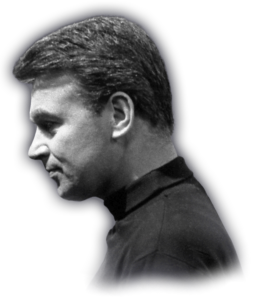
That leaves the TARDIS, who even at this early stage is very much a character in her own right, especially after the two-part Edge of Destruction where her telepathic abilities and semi-sentience become apparent, and then easily forgotten by most fans. We get a bit more of the TARDIS in these early years than just the basic classic console room. We’re introduced to the fault locator, the food machine, and the weird beds where the early crew sleep. Despite the trope of losing access to or being separated from the ship, she’s still very much a part of the show.
Other Thoughts
I thought about talking about the unproduced stories and extra media (books, comics, audios) that fit in and around this season. However, as this is getting long enough already, I plan to make that the subject of a different article (at some point).
I will, however, talk about potential returning concepts (monsters, species, characters, ideas) from this season that I’d like to see on TV in the New Series (whether in Jodie’s run or beyond, I’m not too picky). First, I’d like to see the Thals return. The last time we saw them on TV was in Genesis of the Daleks and while they’ve shown up off and on in books and audio since they’ve never returned to TV. I feel that bringing back the Thals could add a new dynamic to a Dalek story and help keep the overused pepper pots fresh.
I’d also like to see what the New Series can do with the Voord (who may or may not be precursor Cybermen) while keeping the basic design. Bringing back the Sensorites (who finally made their Big Finish debut in Susan’s War) might be fun too. Maybe have them interacting with their cousins the Ood. The other story I’d like to see (and whether this is on TV, audio, book, or comic, I’m fine with any of them) is a return to the Aztecs after the Spanish Conquest. I think that that’s a place ripe for good storytelling. Put the Doctor in the middle of the Spanish Conquest and you have plenty of potential for action and moral dilemma.
So that’s Season 1 of Doctor Who. It’s a bit of a rocky start and isn’t one of the all-time greats, but it got Doctor Who started and does have some good stuff like the first episode and the Aztecs. The strength of this season is in what it introduces to the lore, establishing the Doctor, TARDIS, companions and the Daleks. I’d love to see Traveling the Vortex take a look at the season as a whole. Maybe revisit Marco Polo with the novel and a full recon/audio. I’d also love to hear their takes on the novelizations of these stories and how they compare with their TV counterparts. Anyway, that’s all for now. I may have more reviews/discussions like this in the future, we’ll see. If you want to discuss anything to do with this article or Season 1 in general, hop over to the “Traveling the Vortex Listeners Forum” on Facebook. I’ll include the link here.
~ Jamie



